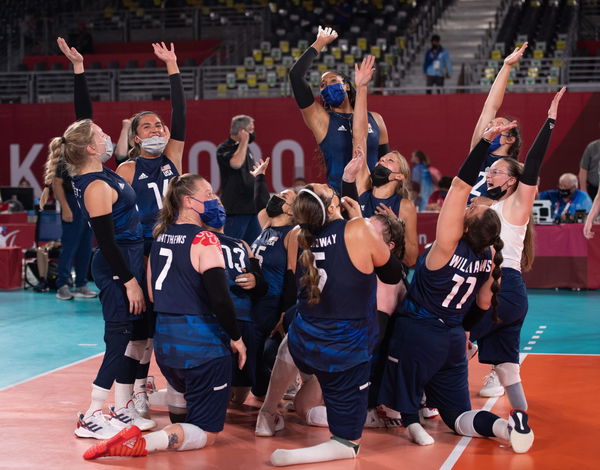Legendary US Coach of Women’s Sitting Volleyball Team Reveals Blueprint for 3rd Consecutive Paralympics Gold

Follow Us

The US Women’s sitting volleyball team has shown great vigor, resilience, and consistency for several years. The team has conquered almost every opponent and reached almost every milestone. In fact, the sitting volleyball team has also bagged gold medals in the previous two Paralympic Games. The legendary US coach behind the success of the team, Bill Hamiter, is now heading to Paris with his invincible team.
According to a recent social media upload, Hamiter said that his team needs something extra to play well in 2024. The coach revealed his blueprint to keep the motivation of his team up in Paris when it was already at its zenith.
A change of fuel to keep the sitting volleyball team going
ADVERTISEMENT
Article continues below this ad
The women’s sitting volleyball team of the US has succeeded in every domain, except finding a constant challenge. The two-time Paralympics champions finished a flawless 2023 season with a 9-0 record. USA Volleyball recently posted a video of the sitting team’s coach Bill Hamiter on its official X handle. Speaking in an interview, the legendary coach revealed how he plans to keep his team motivated for the upcoming Paralympics.
Following back-to-back Paralympic gold medals, U.S. Women's Sitting National Team head coach Bill Hamiter shares how he is preparing his squad for Paris 2024. Episode 76 is out now on all #podcast platforms! #USAVShowPod
Watch now: https://t.co/OV1ftFGCSv pic.twitter.com/w7ZrVMpCHp
— USA Volleyball (@usavolleyball) October 20, 2023
According to Hamiter, “We’ve had a lot of success, but with that success, is also one of those things, ‘what do you do to continue to motivate.’ What do I do to motivate myself? What do I do to motivate the staff? Our players? At one point, it was hey, we want to win a gold medal. Well, I can’t use that anymore.” Hamiter perfectly explained the problem his sitting volleyball team faced. But, the wise coach also revealed that he has a solution up his sleeve.
Trending

Bronny in Deep Waters as $800,000 Suffering Forces LeBron James’ Son to End College Career With Major Declining Numbers
April 27, 2024 01:45 PM EDT

Exclusive: Michael McDowell Reportedly the “Snitch” Who Got NASCAR Team Kicked Out at Talladega
April 26, 2024 07:44 PM EDT

Exclusive: After Kyle Busch & Denny Hamlin’s Criticism of $5 Million NASCAR Decision, Crew Chief Admits to Feeling “Lost” at Talladega
April 27, 2024 09:08 AM EDT

“Very Disturbing”: Ex Wife Pilar Sanders Reprimands Coach Prime for “Stupid” Take on Shelomi’s Transfer Portal Decision
April 26, 2024 12:28 PM EDT

LeBron James Advised To Terminate $99 Million Lakers Contract For Jalen Brunson & Save His Legacy
April 28, 2024 06:14 AM EDT
Get instantly notified of the hottest Olympics stories via Google! Click on Follow Us and Tap the Blue Star.

Follow Us
Hamiter further noted, “And so it’s trying to find what those motivating factors are, not just as a team, but for those individual athletes. What are you trying to accomplish? What do you want to do? How does it affect you personally? Those types of things.” The coach explained that asking these questions can help players perform at their highest level. Bill Hamiter has coached the sitting volleyball program for over 14 years now. While he is currently trying to ensure his players don’t get complacent, there was also a time when he enabled his team to win its first gold medal.
ADVERTISEMENT
Article continues below this ad
The man who changed the face of the US at the Paralympics
Bill Hamiter joined as the head coach of the women’s sitting volleyball team in June 2009. He also held the responsibility of the performance director for all the national sitting teams. The women’s national sitting volleyball team won its first Olympic medal with his tutelage in Beijing in 2008. This was followed by another silver effort at the London Olympics in 2012. The team worked harder as Hamiter guided them and won the world championship gold medals in 2010 and 2014.
ADVERTISEMENT
Article continues below this ad
The success at the world tournaments and the two consecutive silver medals built a strong foundation for the team. This solid foundation helped them to emerge victorious in Rio de Janeiro in 2016. In fact, they carried their momentum to Tokyo as well and won the Olympic gold once again. Now, as the Paris Olympics come closer, Hamiter and the sitting women’s volleyball team will look forward to the Olympics threepeat. Will they be able to smash through all opponents and stand on top for the third time in a row?
WATCH STORY – A Women’s Volleyball Game in Nebraska Gives Both WWE & AEW a Harsh Reality Check
Edited by:

BHUJAYA RAY CHOWDHURY

